Ecology
The Yorenka Tasorentsi Institute is using traditional know-how to address the climate crisis.
Over the past 50 years, human activity has led to massive destruction and pollution of our natural world, to the point where climate change has become the most existential and imminent threat to our very survival. This climate change is primarily fuelled by the burning of fossil fuels and the loss and degradation of tropical forests and is contributing to an upsurge in deadly forest fires, hurricanes, record draughts, and floods. Today, 12-13 million hectares of tropical forests – an area the size of Austria – are deforested per year, an equivalent of forty hectares per minute used for agriculture, logging, mining, and roads.
Today, 12-13 million hectares of tropical forests – an area the size of Austria – are deforested per year
Of this lost forest, some 3.6 million hectares are primary rainforests, old-growth tropical forests that contain a staggering biodiversity and provide life-essential services to the world, such as clean air, clean water and rain. They also capture and store huge amounts of carbon, which is essential to stopping the climate from warming. Yet, in just the last decade, the world lost an area of tree coverage equivalent to the combined area of France, Germany and the United Kingdom. If this pattern continues, the world will lose 289 million hectares of tropical forests by 2050 – an area about the size of India. A quarter of the Amazon is on track to be cut down by 2030. The recent upsurge of deforestation in Brazil, with over a 100% in 2019/2020 is a worrying sign that we must do more to address this crisis.
The science is clear: the loss of forests is undermining international efforts to address climate change, achieve sustainable development, and promote human rights, peace and security. If we are to have any chance of avoiding catastrophic climate change, deforestation must stop.
With this in mind, the Yorenka Tasorentsi Institute aims to provide a pathway for a solution to the current crisis of deforestation by addressing its root causes in a practical, meaningful and exemplary way. Rooted in universal respect for all living things, we recognize that a first and essential step to a meaningful solution lies within the recognition indigenous peoples as stewards for this vital ecosystem in which they have lived for generations.

